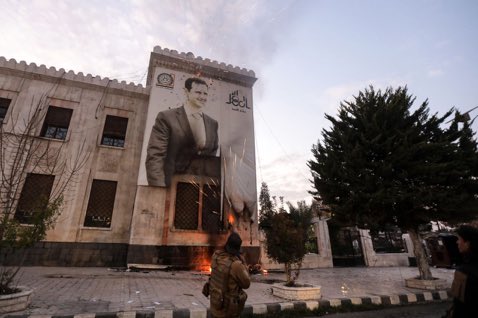DAMASCUS: The Syrian government collapsed early Sunday as opposition forces launched a swift and decisive offensive that captured the capital, Damascus, ending the Assad family’s 50-year rule.
Jubilant crowds filled the streets to celebrate what many viewed as a new chapter in Syria’s tumultuous history.
Syrian state television aired a dramatic video in which a group of men announced that President Bashar Assad had been overthrown, proclaiming that all political prisoners had been freed.
The spokesperson, representing the opposition group “Operations Room to Conquer Damascus,” urged citizens and fighters to preserve the institutions of “the free Syrian state.”
Hours earlier, reports surfaced that Assad had fled Syria to an undisclosed location ahead of the insurgents’ rapid advance, which brought opposition forces into Damascus after sweeping victories across the country.
Many residents expressed shock at the speed of the regime’s downfall, following 14 years of civil war that claimed hundreds of thousands of lives and displaced millions.
As dawn broke over Damascus, residents gathered in mosques to pray and in public squares to chant “God is great” and celebrate the end of Assad’s rule. Anti-Assad slogans echoed across the capital, with people honking car horns in joy.
Teenagers were seen picking up weapons discarded by fleeing security forces and firing them into the air.
Meanwhile, soldiers and police abandoned their posts, and looters stormed government buildings, including the Defense Ministry. Videos showed families entering the presidential palace and emerging with household items.
“I refused to sleep until I heard the news of his fall,” said Mohammed Amer Al-Oulabi, a 44-year-old resident. “From Idlib to Damascus, it only took them a few days, thank God. May God bless the heroic lions who made us proud.”
Even pro-Assad organizations distanced themselves from the fallen regime. The historically pro-government newspaper al-Watan declared, “We are facing a new page for Syria. We thank God for not shedding more blood.” The paper also defended its past actions, stating it had only followed government orders.
The Alawite sect, a core base of Assad’s support, issued a statement urging calm and calling for “reason and dialogue” to prevail, emphasizing unity in the face of change.
Prime Minister Mohammed Ghazi Jalali appeared in a video statement, expressing readiness to hand over power to a transitional government.
However, he later admitted to Al-Arabiya that he had lost contact with Assad and the defense minister late Saturday.
Rami Abdurrahman, head of the Syrian Observatory for Human Rights, confirmed that Assad fled Damascus on Sunday. International reactions were mixed; while Iran remained silent, UAE diplomat Anwar Gargash likened Assad’s flight to a historical footnote, referencing the exile of Germany’s Kaiser Wilhelm II after World War I.
Assad’s legacy is marred by accusations of war crimes, including a 2013 chemical attack on Damascus’s outskirts. His departure marks a dramatic end to years of authoritarian rule.
Opposition forces entered Damascus following a stunning military campaign that began on November 27.
They seized key cities, including Aleppo, Hama, and Homs, meeting little resistance as government forces retreated.
The offensive was spearheaded by Hayat Tahrir al-Sham (HTS) which has sought to rebrand itself as a pluralistic and tolerant movement.
The United Nations Special Envoy for Syria, Geir Pedersen, called for urgent talks in Geneva to ensure an “orderly political transition,” noting the situation was evolving rapidly.
Meanwhile, Russian Foreign Minister Sergey Lavrov expressed regret over the suffering of the Syrian people.
The Israeli military announced deployments to its northern border, citing security concerns amid the rebel advance.
Troops were stationed in the Golan Heights buffer zone to protect the area, which Israel has occupied since 1967. — Agencies



